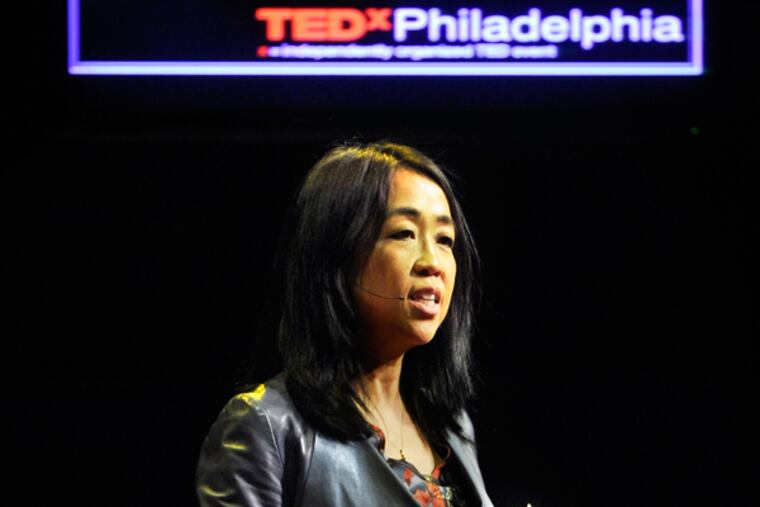A national honor for Philadelphia activist Helen Gym
Spend a few hours with Helen Gym, Philadelphia's famously feisty community organizer, and you see a rabble-rouser on the run, dashing from a TEDx talk rehearsal at Temple University to a rally for public education, where she revved up the crowd.

Spend a few hours with Helen Gym, Philadelphia's famously feisty community organizer, and you see a rabble-rouser on the run, dashing from a TEDx talk rehearsal at Temple University to a rally for public education, where she revved up the crowd.
Gym speaks "truth to power," said State Sen. Vincent Hughes (D., Phila.), who introduced her at the rally Thursday after first teasing her for "troublemaking."
At a White House ceremony Monday, Gym, 45, a cofounder of Parents United for Public Education, a parent-led school watchdog group; and a board member of Asian Americans United, which advocates for ethnic diversity, will add another label to her brand: Cesar E. Chavez Champion of Change.
President Obama established the program to recognize those whose commitment to a more just tomorrow empowers whole communities, the White House announcement said.
The 10 honorees this year embody the steadfast determination of Chavez, who organized a union for California farm workers in the 1960s.
Chavez died in 1993. In 2011, Obama proclaimed March 31 Cesar Chavez Day. He encouraged all Americans to use it as an annual day of national service.
"One of the great lessons of Cesar's life [is] that you don't give up the fight," Obama said recently. "No matter how long it takes, no matter how long the odds, you keep going, fueled by a simple creed - 'Sí, se puede' " - roughly, "Yes, we can."
Clearly, Gym got the message.
She was born in Seattle and raised near Columbus, Ohio, by parents who emigrated from Korea in the 1960s. The immigrant tale of her father, Won Gym, presages the steely determination of Helen, the elder of two daughters.
Wounded during the Korean War, Won Gym recuperated in a prisoner of war camp, was released, and barely survived on the streets of Seoul. A high score on a national education test changed his luck by providing access to a scholarship to George Fox University in Oregon. Fearing he had parasites and might be excluded from the U.S., he told his family, he swigged gasoline to flush out the bugs.
In an interview just hours after the White House announcement, Gym said she never doubted her father's story.
"After he got here, he renamed himself Golden Gym," she said. "This was the place where he would give it his all. . . . Rebuild and remake himself. He didn't want any of us to forget it."
Her father worked as a computer engineer for an insurance company, her mother in food service at Ohio State University. The family worshipped at a Protestant Korean Church, which instilled strong moral values, Gym said.
She enrolled at the University of Pennsylvania, majored in history, and graduated in 1993. She returned to Ohio, did a stint as a reporter at the Mansfield News Journal, and moved back to Philadelphia to join boyfriend Bret Flaherty, a newly minted lawyer. The couple married in 1995. A year later, Gym completed a master's degree at Penn in second-language acquisition. The couple has three children, ages 16, 14, and 10.
"I didn't come back to Philadelphia as an activist," Gym said, "but I learned [from] a very vibrant activist community."
She credits the Philadelphia Folklore Project with teaching her to embrace her racial identity.
She cites Asian Americans United, founded in 1985 to build leadership capacity among diverse Asian groups, as sparking her involvement on issues of anti-Asian violence, public education, and immigrant rights.
"People [at those groups] pushed my thinking every day," Gym said. "They made me rethink privilege; reminded me of history. Reminded me that power is the collective enterprise of people who build communities" and not reserved for politicians.
Over the years, Gym helped create the Philadelphia Public School Notebook, a nonprofit newspaper about city schools. She led campaigns against building a baseball stadium, and later a casino, close to Chinatown, fearing rampant development would drive out longtime residents.
In its citation honoring Gym, the White House highlighted her cofounding of Folk Art Cultural Treasures School, a charter school in Chinatown; consciousness-raising about predatory gambling; and work across different groups in support of quality public education for all children.
Gym demurs when asked about her reputation for tenacious advocacy, saying activist colleagues deserve at least as much credit.
"I may be the noisiest," she says, smiling, "not necessarily the fiercest."
215-854-2541 @MichaelMatza1